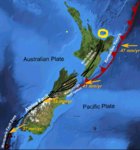jaycee
Well-Known Member
This explains (sort-of) why this little volcanic island is the areas most active. The rate of subduction of the Pacific plate is around 47mm/yr in the area where the volcano formed. More rapid subduction = more material plus gas = more eruptions.


 en.wikipedia.org
en.wikipedia.org
Apparently it's a very popular tourist destination for volcano viewing.


Geology of New Zealand - Wikipedia
Apparently it's a very popular tourist destination for volcano viewing.







